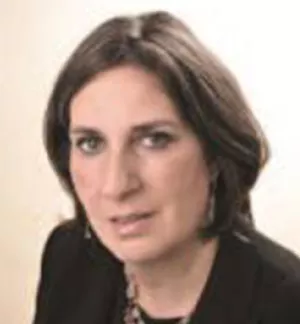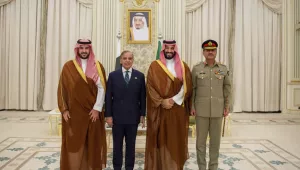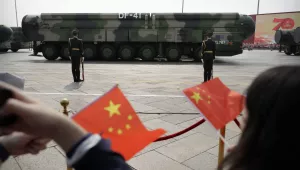Below is the Caspian Studies Program's summary of this event. You can also view Harvard Gazette coverage of the event at http://www.news.harvard.edu/gazette/2003/03.20/09-iran.html
Lieutenant General Tad Oelstrom, director of the Kennedy School’s National Security Program, began the event by highlighting the recent news about Iran’s nuclear program. In early March, the Washington Post reported that Iran was much further along in its nuclear facility at Natanz than the United States had previously anticipated.
The facility at Natanz is already believed to have 160 centrifuges and could be capable of producing enough uranium for several nuclear bombs per year by 2005. In addition to this nuclear complex at Natanz, the Iranian government has, with substantial assistance from the Russian government, continued to make progress at its nuclear energy facility at Bushehr.
Oelstrom then framed the panel in the context of the ongoing security question facing the international community: is Iran merely interested in developing civilian nuclear energy plants, or are these recent moves part of a campaign by Tehran to obtain nuclear weapons?
Steven Miller, director of the Kennedy School’s International Security Program, focused his remarks on how Iran fits into the wider international nuclear nonproliferation context. He began by indicating that there have been a series of recent challenges to the Nuclear Nonproliferation Treaty (NPT). During the early 1990s, both Iraq and North Korea were discovered to be secretly developing nuclear weapons while the International Atomic Energy Agency (IAEA) had been ratifying their compliance with the NPT.
While Iraq and North Korea were both caught evading NPT regulations, Miller noted that the United States only suspects Iran of developing nuclear weapons technologies and has no hard evidence of “cheating.” Miller pointed out that the international community has had an extremely difficult time developing a coordinated response to known nuclear cheaters so it is even more difficult to deal with Iran—where the case rests largely on speculation rather than hard evidence.
Miller next outlined the specific difficulties of developing a coordinated international policy vis-à-vis Iran. While the United States has no formal relations with Iran and considers it to be the foremost sponsor of international terrorism, the European Union has had a policy of engagement with Tehran and has become Iran’s largest trading partner. In addition, Russia has maintained a close relationship with Iran over the past decade, to the point where it has caused serious rifts in U.S.-Russian relations.
Miller then moved on to consider why the regime in Tehran might believe it is in its own interest to develop nuclear weapons. Its “archenemy” the United States has unsurpassed superiority in conventional forces, its regional opponent Israel has long been acknowledged to possess nuclear weapons, its neighbor and antagonist Iraq is trying to develop nuclear weapons, and Pakistan, its neighbor to the east, already has nuclear weapons—all of which put Iran in what it perceives to be a very vulnerable position.
The Bush Doctrine of preventative war, Miller explained, may meet a decisive test in cases such as Iran. In its military planning in Iraq, the Bush Administration is trying to demonstrate its commitment to the notion that it can make it too costly for any regime to develop WMD. Miller noted, however, than both North Korea and Iran have responded to the Bush policy on Iraq by accelerating—rather than halting—their weapons development programs.
Miller concluded by explaining that Iran illustrates two fundamental dilemmas of the NPT system. The first is the problem posed by dual-use technologies. Iran has been able to purchase an array of nuclear-related materials under the NPT regime because it says it is using them for nuclear energy programs. As the case of North Korea has demonstrated, states can legitimately develop nuclear technologies while part of the NPT system and can divert some of these technologies towards military research.
Chen Zak, a fellow at Harvard’s International Security Program who researches Iran and nonproliferation, focused her presentation on why she believes Tehran’s arguments for developing nuclear technology are not entirely convincing.
The main claim that Tehran cites for developing nuclear energy is that it desires to establish energy independence and sell more oil on the international market. Zak also pointed out that Iran believes that it needs to develop WMD technologies because it feels it cannot rely on the international community for any sort of security guarantees. When Iraq used chemical weapons against Iran in the 1980s and the international community took no action, Tehran began to believe that the only way it could protect itself was by developing chemical and biological weapons of its own—which it has done over the course of the last decade.
In addressing Iran’s argument that it is developing nuclear energy programs to supply its domestic energy market, Zak argued that this claim is not supported by Tehran’s natural resource supply or its behavior. Iran, she indicated, has refused significant offers of assistance from countries such as Japan that are interested in helping Iran to build energy plants as long it promises not to build a reprocessing plant. Such an offer, Zak believes, would adequately address Iran’s energy concerns. If Iran were really interested in improving its domestic energy situation, it would accept these types of assistance from other countries.
Zak also argued that Iran would be making a poor strategic decision by seeking security through simultaneously developing nuclear weapons and becoming more isolationist in its foreign policy. She added that there had been many opportunities for Iran to promote regional security, especially since it has a sympathetic audience in many European capitals. However, Iran’s continued support of terrorism, Zak argued, is not consistent with a desire to promote stability in the region.
Zak also questioned Tehran’s claim that it is only interested in the technological benefits that nuclear energy would provide. If this were the case, Zak asked, why didn’t Iran fully declare the new sites it has built and their contents to the IAEA? She also noted that Iran has already developed a “heavy water” (deuterium oxide) production facility at Arak, supposedly for nuclear energy purposes. However, the country does not yet have a declared plutonium-processing plant that would utilize “heavy water” for energy purposes. In addition, according to some publications, the IAEA suspects that Iran has introduced uranium hexafluoride (UF6) to centrifuges at an undisclosed location in the country—which would be a clear violation of the NPT agreement.
Brenda Shaffer, research director of the Caspian Studies Program at Harvard University, focused her remarks on Russian-Iranian nuclear cooperation. She began by saying that while the Bush Administration’s current policy on nonproliferation might seem to be more “active” than the Clinton Administration’s policy, the Clinton Administration placed a significant amount of pressure on Russia to withhold certain types of nuclear technology from Iran—even to the point where it deeply aggravated U.S.-Russian bilateral relations.
One fault with the U.S. policy on Russian-Iranian nonproliferation issues, Shaffer argued, has been to focus exclusively on the “supply” side of proliferation (Russia) and not the “demand” side (Iran). The United States has only had partial success in deterring proliferation from the supply side (for example, in Kazakhstan, Ukraine, and partially with respect to China), and even less success in deterring countries that are trying to obtain weapons. Russia, Shaffer noted, only cooperated with the United States on Iranian proliferation issues when the United States presented Moscow with evidence of specific instances when Russia was caught selling nuclear materials to Iran.
Shaffer also explained that Russia has a strategic partnership with Iran, its neighbor and major trade partner, and is reluctant to endanger that important bilateral relationship by curtailing the cooperation in areas that can advance Iran’s WMD programs. U.S. policymakers have often missed this aspect of the Russian-Iranian relationship, believing that the theocratic regime in Tehran must inherently view Russia as an opponent of its “Islamic Revolution” and that Moscow must inherently fear Tehran due to Russia’s confrontations with its Muslim-populated regions, such as Chechnya.
This oversight, Shaffer suggested, comes from U.S. policymakers’ tendency to take Iranian revolutionary rhetoric at face value and not examine Tehran’s concrete actions in foreign policy. Iran and Russia have come to an accommodation on many issues—for instance, Iran does not interfere with Russia’s crackdown against Islamic and nationalist rebels in Chechnya. In addition, Iran has refrained from mobilizing Muslim populations within Russia and in other countries against Moscow’s Chechnya policies.
In fact, according to Shaffer, Tehran has actually worked to limit Muslim mobilization against Russia over the issue of Chechnya, in return for cooperation with Moscow in military spheres, including areas that advance Iran’s WMD programs. Like Moscow, Shaffer noted, Tehran has at times advanced its domestic interests through cooperation with Russia and tries to coordinate polices aimed to suppress the Republic of Azerbaijan, which Tehran perceives as a potential threat because of its own large Azerbaijani population. What is more, Shaffer explained, Tehran and Moscow also see themselves as “poles” in what could become a new multipolar international system and are therefore inclined to look for common ground, even when it might displease the United States.
Shaffer next moved on to policy recommendations on what the United States can do to address Russian-Iranian proliferation issues. She argued that Washington must focus on the most serious threats that Iranian-Russian cooperation poses. Shaffer also suggested that since economic interests are not the main motive for Russia’s cooperation with Iran, comprehensive economic sanctions have not been an effective instrument to curtail Moscow’s cooperation with Iran.
However, targeted sanctions against individual companies have been effective. Under the 2000 Iran Nonproliferation Act, the United States has placed several companies from China, Ukraine, and Armenia under sanctions for their involvement in sending banned technologies to Iran. Shaffer suggested that since Moscow places a high priority on its relations with Tehran, Washington must offer a substantial incentives to Russia in order to gain its cooperation on Iranian proliferation issues, such as inviting Russia to cooperate in the development of missile defense systems or changing the nature of NATO and Russia’s relationship with it.
Shaffer said it was less important for the United States to focus on other types of military trade between Russian and Iran. It is to be expected that Iran will want to purchase conventional military weapons from Russia, and the United States should, according to Shaffer, not be overly concerned with this kind of trade as long as Moscow is not helping Iran to develop a nuclear weapons program.
Finally, Shaffer argued, the international community should do more to acknowledge the countries that have fulfilled their commitments to the NPT treaty. She cited the case of Kazakhstan, a country that voluntarily surrendered 1500 nuclear weapons under its control in the early 1990s and which has since not received much assistance in return, as an example of the international community’s failure to reward countries that demonstrate good behavior on proliferation issues.
Q & A
Q: One assumption about the new supercritical centrifuges at the Natanz facility in Iran is that they come from Russia. However, Russia has only recently begun to develop this kind of technology. It seems unlikely that Russia would export its most advanced technology to Iran. It is very possible these centrifuges come from Pakistan. So when it comes to focusing on preventing proliferation in Iran, is it clear that the United States knows which country or countries it needs to pressure?
Chen Zak: It is clear that Iran will cooperate with anyone to advance its nuclear aims, and it is quite possible that it would turn to Pakistan or others to obtain nuclear technology. The United States and other countries have to be aware of—and prepared to deal with—these different proliferation possibilities.
Q: Which scenario do you see as most likely? (1) Iran stops supporting terrorism; (2) Iran stops developing WMD; (3) The United States relinquishes the Bush Doctrine; (4) The United States and Iran fight a war; or (5) The United States and Iran forge some kind of agreement where Washington accepts a nuclear Iran?
Brenda Shaffer: The United States and Iran are not on an inherent collision course. A key factor here is that most Iranians do not like the current regime in Tehran. It might be possible to avoid one of the more negative scenarios you mentioned by making more direct appeals to the Iranian people because there is a great deal of discontent in the country towards the regime. The United States should buy some time by delaying the advance of Iran’s nuclear programs, until the Iranian people can initiate a change of regime in the country.
Q: What is the status of Iran’s missile program?
Chen Zak: Iran already has medium-range Shahab-3 missiles, which have a range of 1,300 kilometers. It received most of its assistance for this missile from China and North Korea. They are at work on the Shahab-4, which could have a range of up to 2,000 kilometers. But there have been no accounts that they have been successful in testing the Shahab-4. Iran is also in the initial phase of developing intercontinental ballistic missiles.
Q: Russian domestic politics are very nuanced. It may not be easy for someone like President Putin to stop all nuclear-related trade when Russia does not have very strong institutional frameworks in place.
Brenda Shaffer: Ultimately, the Russian government will have to be accountable for the actions taken by members of its administration. I understand there are nuances to Russian domestic politics, but the government in Moscow will have to take responsibility for the actions of the so-called “free-lancers” in the Russian atomic energy establishment. An illustration of Moscow’s culpability in many of these planned sales by so-called “free-lancers” is that the government rarely dismissed these people from their positions when their actions were discovered, suggesting tacit agreement with their activities.
Q: Don’t forget that nuclear technology was one of Russia’s main claims to great power status. It has been hard to restrict MinAtom, which was once one of the central pillars of the Soviet government. Russia hasn’t quite learned the lessons of nonproliferation yet.
Brenda Shaffer: For the United States to succeed in getting Russia to refrain from cooperation with Iran in areas that can advance Iran’s nuclear programs, it must succeed in convincing Moscow that this policy is not a concession by Russia, but a way for Moscow to promote its own interests.
Summary by John Grennan, Caspian Studies Program
Miller, Steven E, Brenda Shaffer and Chen Zak Kane. “The Forgotten Threat? Iran and Weapons of Mass Destruction.” Council on Library Resources,









